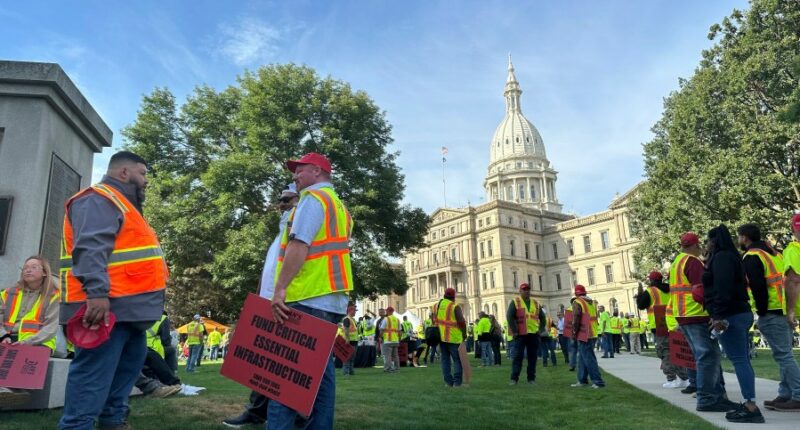Share this @internewscast.com

Three years back, Michigan was a stage for Democratic achievements as Governor Gretchen Whitmer and Democratic legislators had firm control over both the executive and legislative departments.
This year, the story of Michigan is one of enormous partisan divide.
However, intense partisan politics have led to a prolonged legislative impasse over the state budget, threatening a potential government shutdown in Michigan. Whitmer, now in the penultimate year of her term as governor, plans to urge state lawmakers to resolve the situation in her upcoming Tuesday speech centered on Michigan’s economy.
This deadlock carries significant implications for both Whitmer and the state, highlighting how deeply partisan politics can affect the legislative process, well beyond the confines of Washington, D.C., by stalling a critical battleground state.
The risks for Whitmer and Michigan
In anticipation of her speech, Whitmer pointed out that tariffs and their resulting uncertainties have significantly impacted Michigan’s manufacturing industry. With federal-level shutdown concerns mirroring the state’s budget deadline, Whitmer stresses the need for nonpartisan governance.
She emphasized, “In Michigan, it’s essential to approve a balanced, bipartisan budget that reduces costs and makes investments in education, healthcare, public safety, and infrastructure,” she said last week.
While Whitmer has been mentioned as a possible Democratic presidential candidate, she approaches her interactions with President Donald Trump less aggressively than other potential candidates like California’s Governor Gavin Newsom or Illinois’ Governor JB Pritzker.
At home, her best-known campaign priorities are on the line.
Whitmer’s budget package includes what she calls a $3 billion plan creating a sustainable source of funding for roadway and infrastructure repairs. Both of her campaigns for governor were centered on the idea and her catchphrase promise to “ fix the damn roads.”
Previous policy has fallen short in a few key areas, including funding for local roadways.
The Republican House passed its own road plan with key differences. The Democratic-led Senate has not presented a plan for long-term funding in their budget and have held out on doing so as overall negotiations continue.
State and federal shutdowns loom
State officials expect a budget will be passed eventually. The question is when and who will make concessions.
The state’s new fiscal year begins Oct. 1. If there is no budget in place then, the government enters a shutdown. Congress also faces an impending shutdown at the end of the month.
Michigan last entered a government shutdown during economic crisis in 2007 and 2009. Both lasted only hours.
This year’s deadlock is fueled by diametrically opposed lawmakers and no shortage of bad blood between the new Republican-led House and the Democratic-led Senate.
Fueled by support for Trump in Michigan in the 2024 election, Republicans gained a majority in the state House. Since then, the chambers have constantly feuded.
They’ve taken up very little legislation passed over from the opposite chamber, and only 12 bills have been signed into law this year. The Senate has sued the House over bills from the previous year that House leadership have not passed on to the governor for her signature.
In more congenial times, state appropriations chairs hash out details of the budget along with the leaders of the four legislative caucuses. But this year, negotiations have largely centered on Whitmer, Senate Leader Winnie Brinks and the new House speaker, Matt Hall.
Whitmer has not muddied her hands all that much in the course of the budget talks. But Brinks, who led the Senate in its Democratic trifecta years, and Hall, a MAGA Republican, have made no secret about their disdain for the other’s politics. Brinks and Hall have continuously labeled the other as unwilling to meet and say the opposite chamber’s budget contains numerous nonstarters.
Whitmer herself faced criticism after taking a trade trip to Japan, Singapore and Germany earlier this month, just weeks before the budget deadline.
The deadlock over the state budget has also served as a messaging battle between the two chambers, whose members are looking ahead to the 2026 elections. Democrats claim Republicans have deliberately slow-walked the process to further their own agenda while Republicans claim Democrats are ballooning state spending.
Shutdown details are murky
The consequences of a prolonged shutdown are fuzzy. Whitmer’s office and the state budget office have provided little public information.
“While we have begun contingency planning for different scenarios, it’s still too early in the process to determine what a shutdown would look like,” said Lauren Leeds, spokesperson for the state budget office.
It’s unclear how many state employees may be out of work, but in 2019 when Michigan briefly neared a shutdown under Whitmer, about 30,000 state employees, or 62%, faced temporary layoffs. That number did not include workers deemed essential such as prison guards, state troopers and Child Protective Services caseworkers.
Secretary of State offices that handle driver’s licenses and registrations would close along with state parks and rest stops. Liquor in Michigan is sold through a state commission, and judging by 2019 precedent, approval for retail sales would cease.
Only two states did not enact a budget by the start of their fiscal year — North Carolina, where lawmakers passed a stopgap spending plan, and Pennsylvania — according to the National Conference of State Legislatures. In Pennsylvania, lawmakers have still not broken out of the impasse, spelling financial distress for schools and counties that rely particularly heavily on state funding.
___
Associated Press staffers Gary Robertson in Raleigh, North Carolina, and Marc Levy in Harrisburg, Pennsylvania, contributed to this report.

















